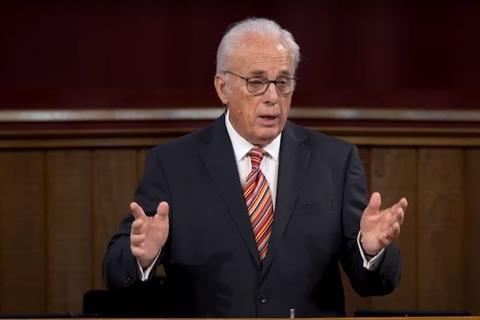The evangelical preacher has told a conference that recognised medical conditions such as PTSD and OCD don’t exist. It’s a depressing example of pastors speaking with absolute authority on things they know little about, says Sophie Killingley

John MacArthur has gone viral for all the wrong reasons.
During a recent interview, the American evangelical pastor, denied the existence of a myriad of health issues. “There’s no such thing as PTSD, OCD or ADHD. Those are noble lies to basically give the excuse in the end of the day to medicate people.”
He explained that people who claim these conditions are just poorly managing their emotions and are being taken advantage of by so-called “Big Pharma”.
Despite having no medical background, or training in psychology or psychotherapy, he confidently diagnosed PTSD “as grief [which is] part of life”, and added that adults receiving medication for PTSD are likely to end up “in LA, homeless on the sidewalk”.
“There’s no such thing as PTSD. There’s no such thing as OCD. There’s no such thing as ADHD.”
— Dean Defuria (@_DeanAnthony) May 1, 2024
— John MacArthur pic.twitter.com/PzZTijKl5x
He also set his sights on children with ADHD, suggesting medicating them sets them on a pathway to becoming “a potential drug-addict, maybe a potential criminal”, as they don’t learn how to “navigate life in a socially acceptable way”.
These words are not only medically inaccurate, they are also pastorally disastrous.
MacArthur’s comments have come at a time when some are concerned there is an overdiagnosis of mental health conditions, and an overmedication in the treatment of those conditions. Certainly, diagnosis of neurodivergence (whether autism or ADHD) is on the rise. There are many reasons for this – better diagnostic rates, better understanding of neurodiversity, and indeed the greater challenges of living in a loud and fast-paced world. Globally, mental health is poor and so it follows that medication is being prescribed at much higher rates. For most, that is not an enslavement to ‘big pharma’, but an essential tool in the fight against poor mental health.
Words have consequences
This has been my story for decades now. I go to therapy, I work for a healthy understanding of my body, and the self-care that it needs. Good sleep, food, community, and hobbies are important factors. But I would be unable to access these other tools were it not for the medication stabilising my brain chemistry in the first place.
MacArthur’s comments are deeply unhelpful for people in his own church. Those in his congregation who have mental health struggles will likely feel unable to reach out for help, as by MacArthur’s standards this is obviously “their own fault” for not dealing with life better. They will feel ashamed. They will be silenced for fear of ridicule. If they do seek help, medical problems will be spiritualised.
It’s also unhelpful for wider evangelicalism. MacArthur has a huge platform. His comments perpetuate unhelpful stereotypes. They reinforce the attitude that those with mental health issues are somehow unspiritual. Even worse, they foster the idea that the existence of mental health struggles is up for debate. Those with PTSD, or poor mental health, or neurodivergence, end up feeling unheard, unseen and judged. And if they’re hearing these messages from a pastor with a platform, many start to wonder if God himself perhaps thinks they are less than, unwanted, and somehow tainted. This is serious. Such words can have spiritually ruinous consequences.
It’s also embarrassing. This is hardly the first time a pastor has spoken with absolute authority on things he knows little about. It is discouraging to see that certain circles of evangelicalism have so little regard for scientific and medical expertise.
I know what unmedicated mental health issues look like. I’ve seen it first-hand. It’s disastrous for the sufferer, the family around them and the community they live in. Access to the right support, therapy and medication is one of the biggest gifts given to us in the last century. Why would we not receive it with thanksgiving like as we receive penicillin or insulin?
My plea to pastors is this: Be humble. When you don’t know, ask.
The sad irony is that those who don’t have adequate help, support and medication when struggling are more likely to find other less helpful ways to soothe or self-medicate.
It’s ok to say ‘I don’t know’
A better way is for pastors to know their place. Pastors are not doctors. Pastors are not sociologists. Lord, spare us from armchair experts who think a divinity degree gives them the right to speak knowledgeably about every area of life.
My plea to pastors is this: Be humble. When you don’t know, ask. When you don’t understand, ask one who does. When those in your congregation struggle, give them the dignity of your compassion, and then the number of a good therapist.
Similarly, for Christians in the pews: Don’t spout confidently about things you have not experienced. As James 1:19 says, “Be quick to listen and slow to speak.”
Why not seek to compassionately support those on what can be life-saving drugs? Why not, as much as possible, seek to alleviate the conditions which bring about so much distress in our world?
Repeatedly, we are seeing excruciating comments coming from evangelical leaders who should know better. It makes you wonder, is it really Big Pharma we should be worried about? Or perhaps Big Eva, and the need to capitalise on their “brands” no matter how extreme the view and unhelpful the content.
McArthur’s bizarre statements and poor illogical rhetoric only confirm one thing for me. It’s time to, “Go Home, John MacArthur.”



































11 Readers' comments